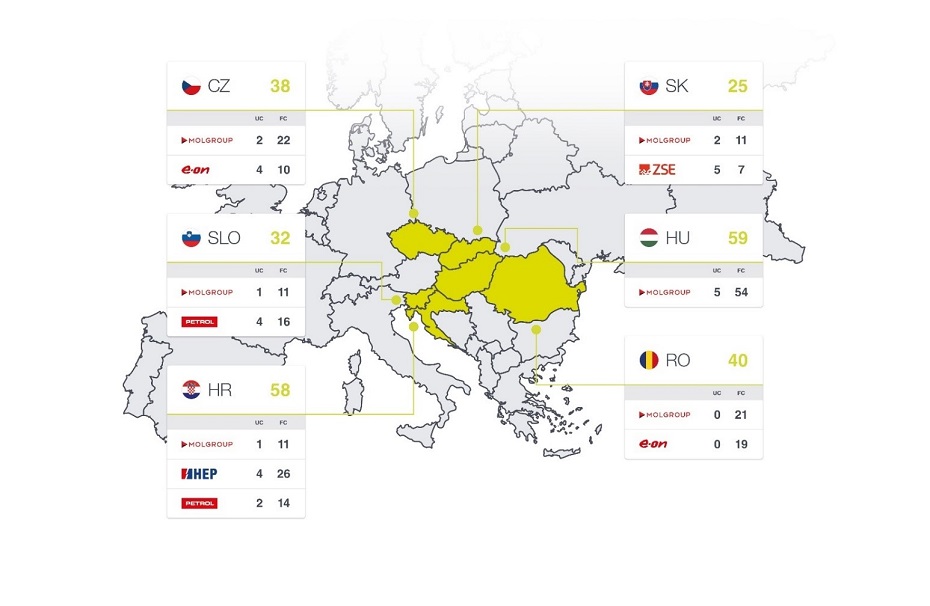252 fast and ultra-fast NEXT-E chargers will be available on one platform in six countries
Petrol has joined forces with the partners of the NEXT-E project for the installation of charging infrastructure for electric vehicles and Hubject, a digital e-mobility expert. The goal of the cooperation is to provide access to fast and ultra-fast charging infrastructure, through a single application for charging electric vehicles in six countries: Croatia, the Czech Republic, Hungary, Slovakia, Slovenia and Romania. 222 fast chargers (50 kW) and 30 ultra-fast chargers (150–350 kW) will be integrated into the Hubject platform, which is the largest cross-border charging network in the world. This will allow carefree long-distance travel in electric vehicles in the region.
The NEXT-E project, co-financed by the European Union from the Connecting Europe Facility, is a joint project of four energy companies (E.ON Group companies from the Czech Republic, Romania and Slovakia, HEP - Hrvatska elektroprivreda from Croatia, MOL Group companies from Hungary, Croatia, the Czech Republic, Romania and Slovenia, companies from the Petrol Group from Slovenia and Croatia) and two car manufacturers. The purpose of the project is to establish the charging infrastructure of 222 fast and 30 ultra fast charging stations in six countries of Central and Eastern Europe, in accordance with the infographic below.

By working with Hubject, the NEXT-E project partners are significantly expanding the impact of the e-mobility network, as they enable the charging of electric vehicles over long distances by integrating the charging infrastructure into Hubject's e-hosting platform.
The use of charging stations for electric vehicles is currently possible through the applications of each individual provider, which creates barriers to roaming on the charging infrastructure of various charging providers and cross-border driving. This will change with the integration of 222 fast and 30 ultra fast chargers from the NEXT-E project into Hubject’s hosting platform. It will be possible to drive electric vehicles from the Czech border to the Adriatic or the Black Sea without any worries, just by using one of the applications of the participating companies. Users of a specific NEXT-E project partner application will thus be able to charge their vehicle at all Hubject platform charging stations, which means that users of electric vehicles in all countries participating in the NEXT-E project will have a better user experience of mobility.
"The NEXT-E project will be crucial in achieving the ambitious goal of zero-emission transport and a carbon-free economy in Europe," said Richard Ferrer, head of the transport innovation team at the INEA (Innovation & Networks Executive Agency). "Interoperability and e-roaming are key functions of an efficient charging network for electric vehicles that enable care-free electric travel on European roads. Charging an electric vehicle has to be very simple, reliable and affordable for European citizens. The availability of this service on the Hubject platform is an important step in this direction, thanks to the pioneering spirit of public and private companies representing the entire ecosystem, from energetics to the automotive, mobility and software industries. Electromobility in Europe is becoming a reality! The European Commission and INEA will continue to support such projects and economic operators through various programs to achieve the goals of the European Green Agreement," he added.
Christian Hahn, CEO of Hubject GmbH, explains: "This collaboration gives charging station operators and e-mobility service providers an easy way to cooperate and improve their own business model. Working with reliable and trusted partners in the NEXT-E project benefits the entire European market and simplifies the charging market."
Uroš Šepec, product manager for CPO and EMSP solutions at Petrol d.d. Ljubljana, adds "Offering an interoperable and user-friendly solution for EV charging in Europe is an important milestone in the realisation of our vision in the field of e-mobility. We are proud of the fact that users of the OneCharge web and mobile applications can seamlessly use charging services across Europe and that together we are contributing to reducing our carbon footprint."
About the NEXT-E project
The NEXT-E project is a unique collaboration of leading power, oil and gas companies and equipment manufacturers who have joined forces to create an interoperable and non-discriminatory network of charging stations for electric vehicles on the main TEN-T corridor in Central and Eastern Europe. The consortium consists of companies from the E.ON Group (Západoslovenská energetika in Slovakia, E.ON Czech Republic, E.ON Hungary, E.ON Romania), companies from the MOL Group (represented through branches in all six participating countries), Hrvatska elektroprivreda from Croatia, PETROL (Slovenia and Croatia) and two vehicle manufacturers.
The network will include 222 fast charging stations (50 kW) and 30 ultra fast charging stations (150–350 kW) and will be part of the key recharging infrastructure for EV in the Czech Republic, Slovakia, Hungary, Slovenia, Croatia and Romania. The NEXT-E network will be interoperable with Western Europe thanks to coordination with other projects co-financed by the European Union under the Connecting Europe Facility (CEF).
More information on the NEXT-E project is available at www.next-e.eu
